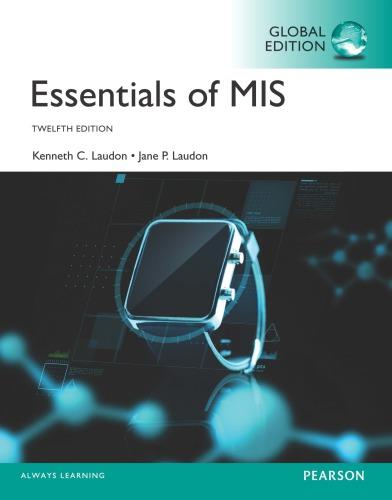Question
Consider hiring a salesman to represent your company to make a particular sale for you. His ability as a salesman may be either good or
Consider hiring a salesman to represent your company to make a particular sale for you. His ability as a salesman may be either good or bad. To be exact: The company is risk neutral in all this. The salesman is risk averse, with a utility function defined as: = where is the amount you pay him, and e is a discrete index of the level of effort he exerts, e = 0 is low effort and e = 1 is high effort. He is either of good ability or of bad ability, each with probability of . He will exert either a high level of effort or a low, and you will be unable to observe which. Note: Good and bad pertain to ability, and high and low pertain to effort. Regardless of his level of ability, he has a reservation utility level equal to 5 reflecting his best alternative employment. He either will make the sale or he won't. The sale, gross of your payment to him, will net you $100 if he makes it. The chances that he makes the sale depend both on his level of ability and on his effort. The particular probabilities of a sale are given by: Probability of Sale High Effort e = 1 Low Effort e = 0 Bad Ability 0.5 0.3 Good Ability 0.9 0.6 Assume that you are only allowed to deal with one salesman. You may offer him a contract, which he will either accept or reject; if he rejects, you net zero. Any time that the salesman is indifferent, he will elect the option that is more favorable to you. (That is, you don't have to worry about ties.) (a) Suppose you are able to observe his ability, and you find that the salesman you are dealing with has bad ability. What, from your point of view, is the optimal contract to offer him? Will he give high or low effort under this contract? What will be your net profits? (b) Suppose you are able to observe his ability, and you find that the salesman you are dealing with has good ability. What, from your point of view, is the optimal contract to offer him? Will he give high or low effort under this contract? What will be your net profits? (c) Now suppose that you are unable to observe the ability of the salesman with whom you are dealing. If you offer him a choice from the contracts you identified in parts (a) and (b), what will be the outcome for you? Why is this? Be very clear and explicit as to what you expect to happen in this case! (d) You are unable to observe the ability of the salesman with whom you are dealing, and you may either offer him a pair of contracts from which he can choose, or a single contract, that he may elect to take or not. (If you offer a pair of contracts, he can refuse employment altogether as well, although remember that when he is indifferent, he is presumed to do what is in your interests.) I want you to produce an offer to him that does better than offering him the pair of contracts from parts (a) and (b). Say what the contract(s) is (are), and what will be the outcome of your offer. You should produce the best contract(s) you can - ideally, you should devise the optimal contract(s) to offer him, and you should prove this is the optimal offering.
Step by Step Solution
There are 3 Steps involved in it
Step: 1

Get Instant Access to Expert-Tailored Solutions
See step-by-step solutions with expert insights and AI powered tools for academic success
Step: 2

Step: 3

Ace Your Homework with AI
Get the answers you need in no time with our AI-driven, step-by-step assistance
Get Started


